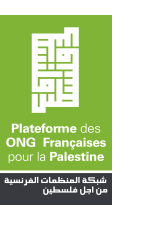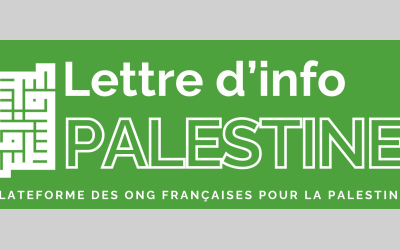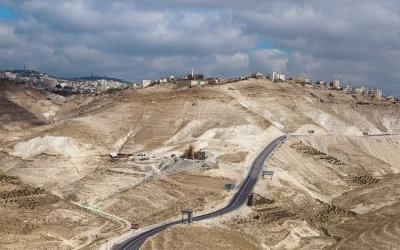

« A general framework for the rural and agricultural sector’s demands »
A General Framework for the Rural and Agricultural Sector’s Demands
July 2006
The Palestinian agricultural and rural sector has been suffering from a complex and multi- facet marginalization, which has had consequences and implications on all walks of rural people’s lives. The situations of the Palestinian countryside have been worsened by the continued aggressive policies and measures of the Israeli occupation authorities. Upon realizing the pivotal social, cultural and economic importance of the countryside and agriculture in the Palestinian entire life additional to the importance of land, which constitutes a pivotal element in the long running conflict, and a crucial foci of the Palestinian national project, the Israeli authorities intensified and escalated its aggression against the countryside namely agriculture.
Following are some indicators of marginalization confronting the Palestinian countryside :
1) A continued deterioration in qualitative and quantitative public and infrastructural services compared to the ones provided to the urban areas ; the service gap between the rural and urban areas reaches up to 45% in favor of urban areas. The cultural and technological gap persists ; 39% of the rural youths (aged 15-19) have access to computer compared to 50% of urban youths. Furthermore, 12% of the same age category in the countryside has access to the internet compared to 24% of the urban youths.
2)A rising poverty rate in the countryside compared to urban areas ; according to the 2005 statistics poverty rate got to 54% in rural areas whereas it reached 48% in cities. It is worth noting that poverty rate is concentrated among the rural families which depend on subsistence agriculture for their main source of income. Poverty rate reached 63% among these families.
3) A limited attention by the Palestinian Authority’s public policies and developmental priorities materialized in the following indicators : agriculture’s share of the PA 2005 budget did not rise over 0.7% ; lack of protection measures for agrarian products ; weak legal system supporting the agricultural and rural sector ; PA’ s persistent withdrawal from the agricultural sector in favor of the private sector ; absence of agricultural school syllabus ; and limited interest in agriculture by donors’ agendas and priorities.
4)A huge withdrawal of agriculture’s contribution to gross domestic produce from 45% during 1970s to 7.1% in 2005.
5)A decrease of cultivated and arable lands results from the Israeli settlement construction, erection of the wall and bypasses additional to the continued Israeli military aggressions on one hand, and the rural arbitrary behavior pertaining to construction expansion.
6)An annexation of the Palestinian economy to the Israeli economy results in Israel’s full control over the Palestinian market and aggressive dumping of its agricultural products in the Palestinian market. The Israeli measures have led to the rise of migrant agricultural workforce in favor of work in Israel and the public sector (after the emergence of the Palestinian Authority in 1994).
7)A persistent abstention of the private sector’s investments in the agricultural sector additional to lack of competence and the inability of the public sector to intervene to solve the very many problems facing the agricultural sector.
8) A negative perception of the agricultural work by particularly young people and intellectuals. Statistics indicated that only 1% of the BA holders do work in agriculture compared to 26.2% who don’t hold any professional qualifications.
Out of this general analysis, PARC wishes to put forward the following issues and demands pursuant to our vision and pursuit to achieve an integrated and balanced sustainable agriculture on the demographic and societal levels, which we recognize as a fundamental access to achieve internal cohesion and improvement of the Palestinian entire situations :
1)Restructuring, reactivating and institutionalizing the co-ordination frameworks and channels between different agricultural sector’s stake holders including the Ministry of Agriculture, non-governmental organizations- Sham’a network- and the private sector under the auspices of a higher agricultural council.
2)Pressuring donors’ agendas to adopt Palestinian developmental priorities pertinent to the countryside and working to achieve partnerships between donors and local groups active in the agricultural field.
3)Revising and modifying the articles pertinent to agriculture of the Protocol on Economic Relations between the Government of Israel and the PLO (Paris Convention) as well as modifying the agricultural and partnership agreements with other countries.
4)Magnifying the role and status of the co-operative work and adopting it as a central economic and developmental approach in the Palestinian agriculture. Furthermore, resolving the problem of agricultural property fragmentation and small holdings.
5)Pressuring the Palestinian Authority to issue a law for the protection of the agricultural lands from the arbitrary construction expansion additional to regulations and policies that can enhance the cultural, service and institutional urban expansion. Pressuring for an agricultural and rural sector’s constant share of 20-25% of the PA public budget.
6)Revising, modifying and endorsing the following laws :
1.Tax refunding law (vat 17%) that must include the animal wealth.
2.Agriculture law.
3.Co-operative work law.
7)Proposing draft laws for the co-operative bank and agricultural insurance.
8)Working on the adoption of the participatory approach as an alternative to agriculture’s privatization approach, and promoting complementary (not competitive) economic pluralism.
9)Pressuring the Palestinian Authority to issue regulations and measures that can protect the Palestinian agricultural produce.
10)Pressuring the relevant stakeholders for the establishment of a national center for rural and agricultural research and planning.
By :
Nizam Attaya
Developmental Media and Information Department
Campagne en cours
Dernières publications
 18 avril 2024
Hôpital Al-Shifa, ventes militaires françaises et demande de cessez-le-feu
Analyses politiques et géopolitiques
Colonisation
Eau
Bande de Gaza
Développement
UE/Israël
Politique française
Jérusalem
Autorité palestinienne
Nations unies
Torture et mauvais traitements
Agriculture
Etat de Palestine
Droit international
Solidarité internationale
Enfance/jeunesse
Histoire/analyse politique
Santé
Prisonniers palestiniens
Vallée du Jourdain
Destructions
Aide internationale
La question palestinienne en France
Société (Palestine/Israël)
Occupation/annexion
Hamas
Société civile
Crime de guerre
UE/Palestine
Liberté d’expression
Armement
Violence des colons
Climat/environnement
Apartheid
Guerre
18 avril 2024
Hôpital Al-Shifa, ventes militaires françaises et demande de cessez-le-feu
Analyses politiques et géopolitiques
Colonisation
Eau
Bande de Gaza
Développement
UE/Israël
Politique française
Jérusalem
Autorité palestinienne
Nations unies
Torture et mauvais traitements
Agriculture
Etat de Palestine
Droit international
Solidarité internationale
Enfance/jeunesse
Histoire/analyse politique
Santé
Prisonniers palestiniens
Vallée du Jourdain
Destructions
Aide internationale
La question palestinienne en France
Société (Palestine/Israël)
Occupation/annexion
Hamas
Société civile
Crime de guerre
UE/Palestine
Liberté d’expression
Armement
Violence des colons
Climat/environnement
Apartheid
Guerre
 11 avril 2024
« La France doit interdire le commerce avec les colonies israéliennes »
Produits des colonies
Droit international
Colonisation
11 avril 2024
« La France doit interdire le commerce avec les colonies israéliennes »
Produits des colonies
Droit international
Colonisation
> Toutes les publications










